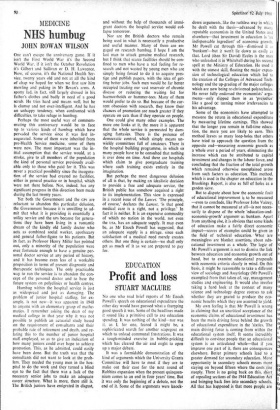NHS humbug
MEDICINE JOHN ROWAN WILSON
One can't escape the anniversary game. If it isn't the First World War it's the Second World War, if it isn't the October Revolution it's Gilbert and Sullivan or D. H. Lawrence. Now, of course, it's the National Health Ser- vice, twenty years old and not at all the kind of chap we hoped for when we first saw him mewling and puking in Mr Bevan's arms. A spotty lad, in fact, still largely dressed in his, father's clothes and badly in need of a good scrub. He tries hard and means well, but he is clumsy and not over-intelligent. And he has an unhappy tendency, when confronted with difficulties, to take refuge in humbug.
Perhaps the most useful way of commem- orating this anniversary would be to face up to various kinds of humbug which have pervaded the service since it was first in- augurated. Some of them were inherited from pre-Health Service medicine, some of them were. new. The most important was the in- itial assumption that the service would, at a stroke, give to all members of the population the kind of personal service previously avail- able only to those who paid for it. This was never a practical possibility since the inaugura- tion of the service had created no facilities, either in general practice or in hospital, which were not there before. Nor, indeed, has any significant progress in this direction been made during the last twenty years.
Yet both the Government and the GPS are reluctant to abandon this particular delusion, the ,Government because it is unwilling to ad- mit that what it is providing is essentially a utility service and the GPS because for genera- tions they have been living in a romantic dream of the kindly old family doctor who acts, as combined social worker, apothecary and general father-figure to his patients. But in fact, as Professor Henry Miller has pointed out, only a minority of the population were ever fortunate enough to have a genuine per- sonal doctor service at any period of history, and it has become even less of a workable proposition in terms of present diagnostic and therapeutic techniques. The only practicable way, to run the service is to abandon the con- cept of the personal doctor and to base the future system on polyclinics or health centres.
Humbug within the hospital service is just as widespread and just as damaging. The problem of junior hospital staffing, for ex- ample, is not new—it. was apparent in 1948 to anyone with an elementary grasp of mathe- matics. I remember asking the dean of my medical college in that year why it was not possible to publish an actuarial study based on the requirement of consultants and their probable rate of retirement and death, and re- lating this to the number of junior hospital staff employed, so as to give an indication of how many juniors could ever hope to achieve promotion. This, as he admitted, could easily have been done. But the truth was that the consultants did not want to look at the prob- lem. They needed the young men in the hos- pital to do the work and they turned a blind eye to the fact that there was a lack of the necessary senior jobs to make an adequate career structure. What is more, there still is. The British juniors have emigrated in disgust, and without the help of thousands of immi- grant doctors the hospital service would col- lapse tomorrow.
Nor are the British doctors who remain being used in what is necessarily a productive and useful manner. Many of them are en- gaged on research humbug. I hope I am the last man to attack genuine medical research, but I think that scarce facilities should be con- fined to men who have a real feeling for re- search and not wasted by young men who are simply being forced to do it to acquire pres- tige and publish papers, with the idea of get- ting better jobs. Such men would be far better occupied treating our vast reservoir of chronic disease or reducing the waiting list for haemorrhoids or hammer-toes. Many of them would prefer to do so. But because of the cur- rent obsession with research, they know their chances of promotion are much greater if they operate on cats than if they operate on people.
One could give many other examples. The more one looks at it, the more it is apparent that the whole service is permeated by dam- aging fantasies. There is the pretence of democratic control, which simply means un- wieldy committees full of amateurs. There is the hospital building programme, in which so many people have to be consulted that nothing is ever done on time. And there are hospitals which claim to give postgraduate training where such training exists entirely in the imagination.
But perhaps the most dangerous delusion of all is that, by making an idealistic decision to provide a free and adequate service, the British public has somehow acquired a right to its implementation. This view is expressed in a recent issue of the Lancet. 'The principle, of course,' declares the Lancet, 'is that good medical care is a right, not a privilege.' In fact it is neither. It is an expensive commodity of which no nation in the world, not even the USA, has an adequate supply. It may even be, as Mr Enoch Powell has suggested, that an adequate supply is a mirage, since each satisfaction of a medical need merely creates others. But one thing is certain—we shall only get as much of it as we are prepared to pay for.






































 Previous page
Previous page